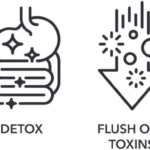
Sugar: How Does It Affect Your Gut Health?
Have you ever felt bloated or suddenly craved sugar? I certainly have. For instance, I used to start my day with a doughnut and end it with a soda. At first, this routine seemed harmless—after all, a little sugar here and there couldn’t hurt, right? However, I soon discovered sugar’s impact on gut health, realizing that this daily habit took a serious toll on my body.
In fact, the American Heart Association warns that consuming too much sugar can lead to excess weight, diabetes, and heart problems. But sugar’s impact on gut health is just as concerning.
The gut, which plays a key role in digestion and mood regulation, is heavily influenced by sugar intake. Excessive sugar disrupts the delicate balance of gut microbiota, leading to digestive problems like irritable bowel syndrome and damaging the beneficial bacteria crucial for maintaining a healthy gut.
In this article, we will explore the impact of sugar on gut health and examine how reducing sugar intake can significantly improve overall health. By understanding sugar’s effects on the body, we can make informed decisions that support digestive health and enhance well-being.
Key Takeaways
- The “sugar gut health impact” can upset the balance of good and bad bacteria in the gut, leading to gut dysbiosis.
- Quickly absorbed added sugars don’t benefit beneficial bacteria in the gut, contributing to health issues like IBS and inflammation.
- Decreasing sugar intake can positively impact gut health and overall well-being.
- Natural alternatives to processed sugars, such as honey and maple syrup, can help reduce sugar consumption.
- Understanding the role of gut microbiota in health is crucial for making informed dietary choices.
Understanding Gut Health and the Sugar Gut Health Impact
Maintaining gut health is essential for overall well-being. The gut hosts trillions of microorganisms that play critical roles in digestion and immune system function. Understanding sugar’s impact on gut health is key to safeguarding against imbalances caused by poor dietary habits.
What is Gut Microbiota
The gut microbiota consists of a community of microorganisms residing in our gastrointestinal tract, including bacteria, viruses, and fungi. They assist in digestion, produce essential vitamins, and combat harmful pathogens. About 70% of our immune system is in the gut, which further highlights how sugar affects gut health when this balance is disrupted.
The Role of Gut Microbiota in Health
The intestinal microbiome plays a crucial role in our health. It aids in nutrient absorption and produces compounds like short-chain fatty acids. Additionally, it regulates immune responses and provides protection to the gut. The effect of sugar on gut health can be profound. A diverse gut microbiota helps reduce the risk of conditions such as diabetes, inflammatory bowel disease (IBD), and psoriatic arthritis.
Factors Influencing Gut Health: The Role of Sugar
Our diet and lifestyle significantly impact our gut microbiota. For example, the Western diet, which is high in sugars and processed foods, can harm it, exacerbating how sugar affects gut health and reducing beneficial microbes.
Additionally, antibiotics, stress, and insufficient sleep negatively impact gut health. However, consuming high-fiber and fermented foods, along with taking probiotics, can help mitigate the damaging effects of sugar on the gut.
| Factor | Impact on Gut Microbiome |
|---|---|
| Diet | High-fiber foods and probiotics promote beneficial bacteria growth; excessive sugar can decrease diversity. |
| Antibiotic Use | It can reduce bacterial diversity and disrupt the gut microbiota balance. |
| Stress | It may negatively affect gut microbiota composition and diversity. |
| Sleep | Affects the regulation and balance of gut microbiota. |
Maintaining a balanced diet and healthy lifestyle is crucial for gut health. Additionally, drinking plenty of water, taking prebiotic and probiotic supplements, and staying active are essential for supporting digestive health. Together, these steps are significant for your digestive health and general well-being.
Types of Sugars and Their Impact on Gut Health
First, it helps to know the different types of sugars and how they affect our diet. With this understanding, we can guide ourselves toward healthier eating habits. Now, let’s look at natural versus added sugars, identify where added sugars come from, and discuss the sugar surge in Western diets.
Natural vs. Added Sugars: Understanding the Gut Health Impact
Natural sugars are present in whole foods such as fruits and vegetables. These foods are rich in fiber, vitamins, and minerals, which slow digestion and cause a gradual increase in blood sugar levels. Conversely, added sugars are introduced during food manufacturing or cooking. They are typically found in processed items, providing calories without any nutritional value.
Common Sources of Added Sugars
Added sugars hide in many foods. Here are some common hiding spots:
- Soft drinks, energy drinks, and sports drinks
- Grain-based desserts, such as cookies, cakes, and pastries
- Fruit drinks, which often contain high levels of added sugars
- Candy and other sweet treats
- Breakfast cereals and snack bars
The Rise of Sugar Consumption in the Western Diet
Sugar consumption in the West has increased, particularly from added sugars. More processed and convenient foods contribute significantly to this rise. From 2005 to 2010, research by Ervin RB and Ogden CL showed U.S. adults ate lots of added sugars. In 2017, the United States Department of Agriculture’s Economic Research Service also noted increased sugar and sweetener consumption.
A 2012 study by Sylvetsky AC and others reported more low-calorie sweetener use in America.
Now, take a look at some stats:
| Year | Study/Source | Key Findings |
|---|---|---|
| 2005-2010 | Ervin RB, Ogden CL | High consumption of added sugars among U.S. adults |
| 2012 | Sylvetsky AC et al. | Increase in low-calorie sweetener consumption |
| 2017 | USDA Economic Research Service | Rising trend in sugar and sweetener consumption |
Excessive sugar consumption can result in health issues such as metabolic syndrome and type 2 diabetes. Understanding the different types and sources of sugar is essential for improving health. Making informed dietary choices is crucial for maintaining well-being.
How Sugar Affects Gut Microbiota and Overall Health
Our diet significantly impacts our gut microbiota. Consuming excessive sugar can disrupt the balance of bacteria in our gut.
Bacterial Imbalances and Dysbiosis: The Sugar Gut Health Impact
Excessive consumption of glucose and fructose alters gut bacteria, a condition known as dysbiosis. A 2018 study found that this diet-induced metabolic issues in mice without causing weight gain. Thus, sugar disrupts the balance between beneficial and harmful bacteria.
Impact on Short-Chain Fatty Acids: Sugar’s Role in Gut Health
A healthy gut produces short-chain fatty acids (SCFAs) like butyrate, which help maintain the strength of the gut lining. However, excessive sugar intake can disrupt the production of SCFAs. A 2012 study revealed that simple sugars disrupt the production of short-chain fatty acids (SCFAs).
Sugar’s Consequences for the Intestinal Barrier
The gut barrier is crucial for nutrient absorption and immune defense. However, consuming large amounts of sugar promotes the growth of harmful bacteria, which weakens the gut barrier. In fact, a 2018 study showed that fixing gut bacteria could help with gut problems. As a result, a weakened gut barrier allows harmful substances to enter the bloodstream, triggering inflammation and disease.
“The average American adult consumes over 15 teaspoons of sugar per day, surpassing the recommended daily intake of 9 teaspoons for men and 6 teaspoons for women. The United States leads as the highest consumer of sugar globally.”
Understanding how sugar affects gut microbiota is essential. Making informed dietary choices helps support gut health by promoting a balance of beneficial bacteria, supporting the production of essential compounds, and maintaining a robust gut barrier.
| Impact | Description | Study |
|---|---|---|
| Dysbiosis | Imbalance of gut bacteria due to high sugar intake | Do MH et al., 2018 |
| SCFA Disruption | Interference with the production of short-chain fatty acids | Zoetendal EG et al., 2012 |
| Intestinal Barrier Compromise | Increased mucus-degrading bacteria lead to a weakened barrier | Zhu W et al., 2018 |
Sugar Gut Health Impact
It’s exciting and concerning to see sugar’s effect on our gut health. Our gut houses trillions of bacteria and yeasts that are essential for digestion and overall health. A lot of research shows that too much sugar can upset this balance.
Short-Term Sugar Gut Health Impact
Long-Term Consequences of Sugar on Gut Health
Over time, excessive sugar intake can lead to serious health problems. Specifically, it contributes to chronic inflammation, which is associated with obesity, fatty liver disease, and diabetes. Additionally, it raises the risk of gut diseases, significantly impacting overall health.

Research Insights on Sugar Gut Health Impact
Recent studies have underscored sugar’s detrimental effects on gut health. For example, research shows that a sugar-rich diet increases inflammation. Additionally, high sugar consumption may contribute to the development of autoimmune diseases, further illustrating its harmful impact on the gut.
Thus, examining sugar’s impact on gut health provides valuable insights. It not only disrupts the microbiome but also compromises the immune system. As a result, the world needs to research this more to address the health problems caused by excessive sugar consumption. Ultimately, choosing natural sweeteners over simple sugar is crucial to maintaining a healthy gut.
Health Risks Associated with High Sugar Intake and Gut Health
Americans are consuming a lot of sugar every day. On average, adults in the U.S. consume about 17 teaspoons of added sugar daily. This represents approximately 14% of the total caloric intake in a 2,000-calorie diet, which far exceeds the recommended limit of less than 10%.
As a result, excessive sugar consumption can lead to weight gain, which, over time, can contribute to more severe conditions like diabetes. Specifically, individuals who consume high amounts of sugar are at risk for type 2 diabetes and insulin resistance. Excessive sugar consumption negatively affects blood sugar levels and overall health. Over time, this can lead to serious conditions such as type 2 diabetes and insulin resistance. Moreover, too much sugar harms your blood sugar levels and overall health.
High sugar intake is also detrimental to heart health. It can elevate triglycerides, raise blood pressure, and promote inflammation— all of which are major risk factors for heart disease. As a result, individuals who consume more sugar are at a higher risk of developing heart problems compared to those who limit their intake. Sugary drinks, in particular, are especially harmful to heart health.
Furthermore, sugar is terrible for your teeth, too. It can cause cavities and tooth decay because sugar feeds harmful mouth bacteria. Thus, eating less sugar and taking good care of your teeth is critical.
To mitigate these effects, incorporate fiber-rich and probiotic foods into your diet. Examples include fruits, vegetables, yogurt, and kefir. Additionally, consider using natural sweeteners like stevia or monk fruit as alternatives to sugar.
FAQ
Q: How does sugar affect gut health, and how can I reduce my intake?
A: Sugar can harm your gut bacteria balance. This leads to inflammation and a weak intestinal barrier. You can eat more whole foods and less processed ones to cut down on sugar. Also, avoid sugary drinks and watch out for hidden sugars on labels.
Q: What is Gut Microbiota?
A: The gut microbiota are microorganisms living in our gut. They help with energy, protect against harmful germs, and support our immune system. They also keep the gut barrier strong.
Q: The Role of Gut Microbiota in Health
A: The gut microbiota helps us digest food and fight off harmful germs. It also aids our immune system and makes vital nutrients. A balanced gut microbiota is key for good health.
Q: Factors Influencing Gut Health
A: Many things affect gut health, like what we eat, our lifestyle, antibiotics, stress, and our genes. Overeating sugar is terrible for our gut microbes.
Q: Natural vs. Added Sugars
A: Natural sugars come from fruits and vegetables. They digest slowly. Added sugars are in processed foods and get absorbed fast. They can cause health problems.
Q: Common Sources of Added Sugars
A: Added sugars are primarily in sodas, energy drinks, sports drinks, desserts, and fruit drinks. They’re too familiar in our diets.
Q: The Rise of Sugar Consumption in the Western Diet
A: The Western diet has a lot of sugar but needs more veggies, fruits, and fiber. This alarming trend leads to health issues and upsets our gut microbes.
Q: Bacterial Imbalances and Dysbiosis
A: Overeating sugar can disrupt the balance of our gut bacteria, a condition called dysbiosis. This is bad for our gut and our health.
Q: Impact on Short-Chain Fatty Acids
A: Too much sugar reduces the production of short-chain fatty acids. These acids are essential for our gut wall, nutrient absorption, and immune system.
Q: Consequences for the Intestinal Barrier
A: Too much sugar feeds bacteria that break down mucus in our gut. This weakens the gut barrier, making us prone to germs and inflammation.
Q: Short-Term Effects on Gut Health
A: Too much sugar can temporarily change our gut microbes, which can cause inflammation and weaken our immune system.
Q: Long-Term Health Consequences
A: Over time, excessive sugar intake can lead to serious health conditions, including metabolic disorders, fatty liver disease, and gastrointestinal diseases, all due to a disrupted gut balance.
Q: Research Insights on Sugar and Gut Health
A: Studies in journals like Diabetology, Nutrients, and the International Journal of Molecular Sciences highlight sugar’s harmful effects on gut health. They say we should all eat less sugar.
Q: Health Risks Associated with High Sugar Intake
A: Overeating sugar can lead to obesity, diabetes, heart disease, and cavities. The connection between sugar, gut microbiota, and overall health is critical.
Source Links
Studies on Sugar’s Impact on the Gut Microbiome
- Do Added Sugars Wreak Havoc on Your Gut-Microbiome? What You Need to Know! — GutFit Nutrition
- How Sugar Affects Gut Microbiota
- Sugar Disrupts Microbiome, Eliminates Protection Against Obesity and Diabetes
- Effects of Sweeteners on the Gut Microbiota: A Review of Experimental Studies and Clinical Trials
- High Intake of Sugar and the Balance between Pro- and Anti-Inflammatory Gut Bacteria
Gut Health and Inflammation
- How Sugar Affects Your Gut – Life Force Physiotherapy
- The Connection Between Sugar and Your Gut
- Gut Check: Is Sugar Bad for Your Gut Health?
- 11 Reasons Why Too Much Sugar Is Bad for You
Gut Health Restoration
- How to Improve and Reset Gut Health
- How Does Sugar Contribute to Leaky Gut
- Adaptation of the Gut Microbiota to Modern Dietary Sugars and Sweeteners
General Health and Sugar Consumption
largehints
hiI like your writing so much share we be in contact more approximately your article on AOL I need a specialist in this area to resolve my problem Maybe that is you Looking ahead to see you
Belli Health
Thank you but I am not available for that.













































2 comments